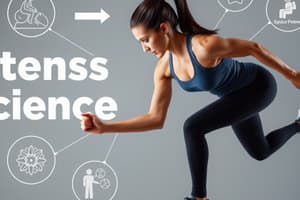Podcast
Questions and Answers
Heart rate is a key component in managing your exercise.
Heart rate is a key component in managing your exercise.
True (A)
Your workouts should work for you, fit your personality and interests, meet your needs, target your fitness goals, and contribute to developing good fitness habits.
Your workouts should work for you, fit your personality and interests, meet your needs, target your fitness goals, and contribute to developing good fitness habits.
True (A)
What type of exercise aims to fit your personality and interests while targeting your fitness goals?
What type of exercise aims to fit your personality and interests while targeting your fitness goals?
Cardiovascular exercise
What is stretching or other exercises that help prevent cramps, stiffness, and injuries called?
What is stretching or other exercises that help prevent cramps, stiffness, and injuries called?
What type of physical exercise specializes in the use of resistance to induce muscular contraction which builds muscular strength and endurance?
What type of physical exercise specializes in the use of resistance to induce muscular contraction which builds muscular strength and endurance?
What are the three elements you need to record with each strength training exercise?
What are the three elements you need to record with each strength training exercise?
What is aerobic exercise geared toward raising the heart rate for an extended period of time?
What is aerobic exercise geared toward raising the heart rate for an extended period of time?
What is defined as the ability to do something?
What is defined as the ability to do something?
What is the ratio of fat tissue to lean muscle tissue and bone in the body called?
What is the ratio of fat tissue to lean muscle tissue and bone in the body called?
What are goal setting strategies?
What are goal setting strategies?
What does SMART stand for?
What does SMART stand for?
What does FITT stand for?
What does FITT stand for?
What are the two main types of exercise?
What are the two main types of exercise?
Do you need to have rest times between strenuous workouts?
Do you need to have rest times between strenuous workouts?
You must have a plan if you want to reach your fitness goals.
You must have a plan if you want to reach your fitness goals.
Is progress linear?
Is progress linear?
What are some examples of behavioral strategies to help achieve fitness goals?
What are some examples of behavioral strategies to help achieve fitness goals?
Too often, planning is an afterthought; it is important to have a plan to reach your fitness goals.
Too often, planning is an afterthought; it is important to have a plan to reach your fitness goals.
When setting fitness goals, it's important to challenge yourself and your physical abilities.
When setting fitness goals, it's important to challenge yourself and your physical abilities.
"Lose Weight" is an example of a specific goal to improve your fitness level.
"Lose Weight" is an example of a specific goal to improve your fitness level.
What are characteristics of anaerobic exercise?
What are characteristics of anaerobic exercise?
How long is anaerobic exercise?
How long is anaerobic exercise?
Flashcards are hidden until you start studying
Study Notes
Key Concepts in Fitness
- Heart Rate: An important metric for managing exercise intensity.
- Personalized Workouts: Effective workouts align with individual personality, interests, and fitness goals while fostering good habits.
Types of Exercises
- Cardiovascular Exercise:
- Also known as aerobic exercise, it raises heart rate for extended periods.
- Characterized by using fat with oxygen for energy; typically low intensity and longer duration (25 seconds or more, or over 15 reps).
- Strength Training:
- Involves resistance to build muscular strength and endurance.
- Three essential elements to record: sets, reps, and time.
- Flexibility Training:
- Involves stretching to prevent cramps and stiffness, enhances range of motion.
Physical Fitness Terminology
- Endurance: The capacity to sustain physical activity over time.
- Body Composition: The ratio of fat to lean muscle and bone tissue.
- SMART Goals: Specific, Measurable, Attainable, Realistic, Timely goals essential for fitness planning.
- FITT Principle: Frequency, Intensity, Time, Type of exercise.
Exercise Types by Intensity
- Aerobic Exercise:
- Lower intensity focused on improving endurance and stamina.
- Anaerobic Exercise:
- Involves short, high-intensity bursts aimed at increasing strength and power.
Training Guidelines
- Target Heart Rate: Ideally, maintain a heart rate of 65%-85% of maximum during workouts.
- Rest Times: Essential between strenuous workouts to allow body recovery and cell repair.
- Duration of Exercises:
- Aerobic: Exceeds 25 seconds or more than 15 repetitions.
- Anaerobic: Typically lasts 1-25 seconds or less than 15 reps.
Goal Setting and Progress
- Behavioral Strategies:
- Examples include utilizing school gyms, preparing workout attire in advance, and maintaining dietary restrictions.
- Linear Progress: Fitness improvement is non-linear; all progress, ups and downs, are crucial.
- Challenge and Adjust: Setting goals should push physical limits while addressing personal health needs like weight loss or lowering BMI.
Importance of Planning
- Having a defined fitness plan is crucial for reaching goals.
- Planning should be a priority, not an afterthought in fitness.
Studying That Suits You
Use AI to generate personalized quizzes and flashcards to suit your learning preferences.




